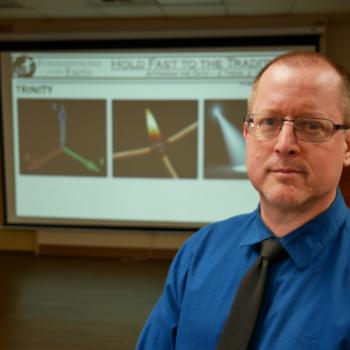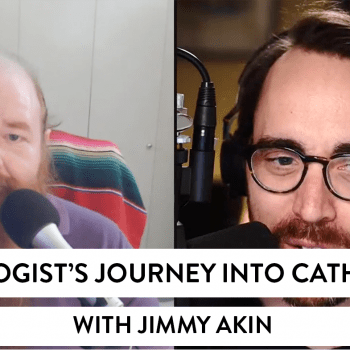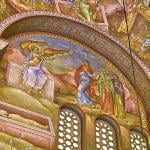
I was recently in a conversation about science and religion with a stranger in a coffee shop. It was part of a lecture series put on by a few friends of mine, a discussion of issues at the intersection of the secular and religious and the conversation turned to the idea of God’s imprint in nature and the history of science.
Science, in its origins and most of its history, traditionally led practitioners closer towards God. Studying God’s creation, which was the pursuit of science, actually led believers towards a greater appreciate and awe of God the Creator. Science was a Christian pursuit. This is why there’s still an observatory at the Vatican—and a scientist-monk on staff.
It’s been popular science’s growing antagonism towards faith and religion that’s led, in turn, to religion’s increasing skepticism and wariness of science. It’s a mutually bad relationship, but ask any Christian working in the sciences and you’ll find that there are lots of believers out there. That science—on the ground science done by scientists—isn’t actually as opposed to faith as the loudest voices make it out to be.
There are, actually, lots of scientists who believe in God and whose faith and convictions, whose research and experimentation and inquiries, actually lead them closer to their Creator.
In conversation, the idea came up that belief in God actually makes it easier to understand the physical world. That, actually, believing in a Creator with a divine plan for His creation rather than cosmic chance makes a lot more sense—and was less stressful of a position to explain and maintain. It was, simply put, more simple.
If we choose not to believe in a Divine Creator we’re suggesting that the universe, and everything it contains, happened to come together through random chance; based on some kind of natural selection. This requires that protons somehow knew how to be attracted to electrons; that a seed somehow knew to grow into a tree; that a fish somehow knew to grow legs and leave the sea.
That every awe-inspiring thing we see around us, all of the order in nature, somehow came about through chaos.
“Isn’t it easier?” I said, “to just believe that God created it.”
Doesn’t it make more sense to see the imposed order of things; the plan for the seed to become the tree; the attraction of the proton to the electrons to be inspired by the will of God—put into motion by God.
It is much more a leap of logic to believe that everything around me simply came into being through chance.
Two examples.
First, let’s take the protons and electrons. I would suggest that there’s no way for a proton to be attracted to a neutron by itself. It cannot have a goal in mind (i.e., to be attracted to a electron) because it cannot think, it has no mind or creativity. It cannot think outside itself. Therefore, a law which says the proton is attracted to an electron must be imposed on it.
If a law is being imposed on the proton then it must be imposed by an outside source.
It is much more simple to believe that that source is God, and omnipotent creator, rather than some random chance event in the universe.
(And, in fact, since protons are always attracted to electrons this couldn’t even be explained by “random chance” anyway. It is not random.)
Second, let’s take the idea of simplicity. In our coffee shop conversation, I suggested that it’s easier to look around and say that God created everything rather than to try and wrap our heads around this all coming together through random confluence and happenstance; that it is divinely ordered rather than emergent through chaos.
Not all simple things are true, and someone could easily object on those grounds, but consider this. Occam’s Razor suggests that when several different explanations exist the one with the fewest assumptions is more likely. So, which is more likely in this scenario. I come home to find my couch is torn to pieces and my dog is sleeping happily amongst the ruins. Do I appeal to the most simple explanation, removing all assumptions, that my couch tore itself apart? This would be the easiest of explanations, involving the fewest assumptions and variables, including no other actors or agents or outside influences, but does it make the most sense?
Instead, wouldn’t it make more sense to complicate the scenario by adding in my dog as the culprit?
Here I’ve actually complicated the situation by adding an actor or an agent (i.e., my dog) but the situation is explained much more sensibly.
Is it possible that my couch simply ate itself? I suppose all the fabric seams could give way at once, by the most improbable of odds. However, it makes much more sense that my dog simply decided to have an early afternoon snack.
The universe is the same way.
Is it possible that from nothing everything sprang into existence and ordered itself exactly to make the world we see today? Or is it more likely that something is planning and organizing from a greater vantage point than ours?
I would submit that it’s the latter, even if it appears to complicate the explanation it actually makes more sense.
Ultimately, we can walk logically, together, up to a point.
Does belief in a Creator God make more sense than believing that the ordered universe emerged from utter chaos? I think so, and I think I’ve logically shown that. I think I’ve shown, quite sensibly, that it actually makes more sense than trying to bend our minds around atheism or a naturalistic explanation of the world. The couch most likely will not eat itself. A proton will not be attracted to an electron, every time, without a law being imposed. But that’s where I have to stop; to go further, to decide what that means for your life has to be up to you.
Does it make sense to try to wrap your head around a chaotic universe somehow ordering itself? A self-eating couch? Or could it be that an outside, organizing force, must instead exist? And that, we call God.
















